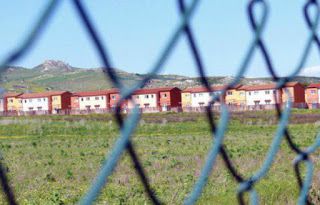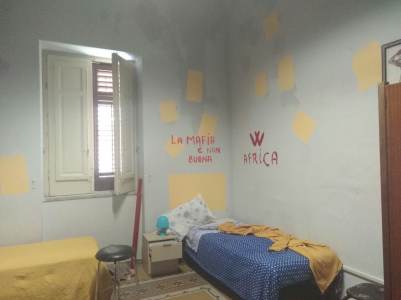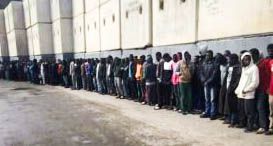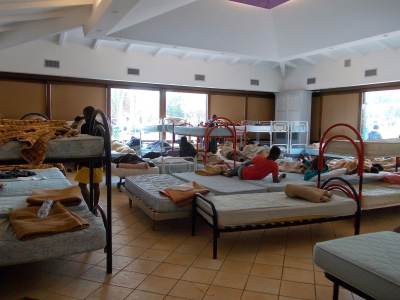Out of Initial Reception, Into Mineo: What Future Awaits 18 Year Olds?
“Things are going better now, because they’re going to transfer me soon.” ‘A’, originally from Ghana, turned 18 a few months ago. For the past year he has been living in one of the big centres of initial reception for unaccompanied foreign minors in the Province of Catania, though he asked us not to name it. We met each other here in June last year. He was very different from how he is now. It has been a year of pain, confusion, attempts at dialogue and small “victories”. One of these was signing up at school, something for which ‘A’ and a dozen other young men at the centre campaigned from the start. It was in fact at one of these ‘protests’ in the form of a letter sent to the centre’s managers that we met him.
“They promised school to us for four months, and instead we’re still waiting, there hasn’t even been an Italian lesson” they told us. And furthermore, “there isn’t enough food or clothes, and we’re worried that if one of us gets ill the doctor will never come. It’s only the very worst cases which end up immediately in hospital, with the ambulance. A legal guardian? Most of us don’t even know what that is.”
Today ‘A’ is making an appeal against a negative response from the Territorial Commission regarding his request for international protection. His lawyer does not speak English but he says they manage to understand each other, even if the visits are very few. He managed to explain to her that at the Commission interview he did not have an opportunity to explain the reason that he ran away from his country. As is the case for so many people, the only legal assistance he has received worthy of the name came during the phase of making an appeal, and not immediately from the start, as is provided by law.
His centre still hosts 60 people on average, including many 18 year olds, with peaks of 80-100 people. Often people leave on their own after a few days. ‘A’ goes to the local school, and tells us enthusiastically about the middle school entrance exams which are coming up. “The diploma is the starting point, then I want to sign up for an IT course. I’m already practicing, with the help of one of the members of staff and his PC. They’ve told me that I’ll be transferred soon, no doubt to a centre run by the central service (SPRAR*), and I know that there everything will be easier.”
Having stayed in the centre for a period far beyond the declared limits in a centre of this kind, perhaps ‘A’ will finally go to a “second reception” centre, which has been due to him for some time. Indeed, the illegitimate practices never seem to finish, and come back to haunt his journey: a few hours after our meeting, ‘A’ tells us that tomorrow he will be transferred to the CARA* at Mineo, along with others from his centre.
In the last few months we have learnt about hundreds of similar cases: young men who have just turned 18, after having remained for months – sometimes years – in initial reception centres, or communities for minors, only to then be transferred en masse to the CARA at Mineo. Often they only have a few hours’ warning. They thus move from one centre for initial reception to another similar one, because this is yet again initial reception, or ought be so-called, with all due respect for the laws and directives which are breached continually.
The “Extraordinary reception measures for unaccompanied foreign minors” legislated through Decree n. 113 of 2016 signaled yet another step backwards for the protection of minors’ interests, activating temporary reception structures with a maximum capacity of 50 places, as well as services which are clearly inferior than those foreseen by international agreements. This decision was clearly made to disincentivise local councils from opening new SPRAR projects, instead delegating the opening of the centres to the Prefectures. This has provided new business for frequently inexperienced companies with few scruples. In the space of only a few months, in fact, the new “very first reception”centres for minors have rapidly multiplied, becoming for all intents and purposes the same as the extant Extraordinary Reception Centres (CAS*) for adults. Overcrowding, services of the lowest quality, lack of interpreters and the safeguards provided by law, insufficient numbers of staff, who are unpaid and often unprepared – this is the situation in dozens of centres which have got to know till now.
The workers try to placate the boys’ worries by promising a transfer before long, the delay in which they do not manage to justify. The large number of people present makes the constructive management of conflicts extremely difficult, and without doubt obstructs the commencement of a journey of inclusion in the local communities, which themselves are often isolated and very small. In the meanwhile, the young men lose all feelings of trust, as well as the hope of building a better life, taking the first opportunity to run away or join the ranks of those exploited in the fields, with all the consequences of such a life.
In the Province of Catania, even those who resist and manage to begin a basic process of education and socialisation then see their journey interrupted as soon as they hit 18, and are transferred to that symbolic location of “no protection” represented by the CARA at Mineo. There are still more than 3,000 people registered to the complex, and the spaces devoted to asylum seekers are being restricted, given that there have been building works for a month now, so that it can officially become one of the new Sicilian Hotspots, as Gabrielli, the Chief of Police, recently announced.
At Mineo the newly arrived migrants live alongside court witnesses, refugees who have been waiting relocation for months, vulnerable subjects, those with rejections sent from other centres, and many people just passing through. The goal for those who want to survive the place is to know how to assess, on a daily basis, the logic of oppression and violence which regulates life inside the camp. Italian language, work, health and documents are all matters which come second, ruled over by the laws of accident and luck. The complaints and reports we have gathered from migrants passing through the CARA over the last few years completely demolish the hypocritical speeches made by politicians and the managers who paint the centre as an example of “excellent reception”. Hundred of refugees have described for us a situation of total abandonment, where only the strongest and luckiest manage to stay afloat. But the despite all of this, and also notwithstanding the ongoing investigations into the management of the CARA, the Prefecture is systematically transferring new migrants to Mineo, bolstering the revenue of those right at the top. “This camp is 50 times as large as where I was before, but I feel like I’m invisible here” says ‘A’. “It seems I have to start from scratch.”
It is now up to us to help him to not simply disappear into the mass.
Lucia Borghi
Borderline Sicilia
Project “OpenEurope” – Oxfam Italia, Diaconia Valdese, Borderline Sicilia Onlus
*CAS = Centro di Accoglienza Straordinaria (Extraordinary Reception Centre)
*SPRAR = Servizio Centrale del Sistema di Protezione e Accoglienza per Rifugati e Richiedenti Asilo (Central Service for the Housing and Protection System for Refugees and Asylum Seekers)
*CARA = Centro di Accoglienza per Richiedenti Asilo (Reception Centre for Asylum Seekers)
Translation by Richard Braude







